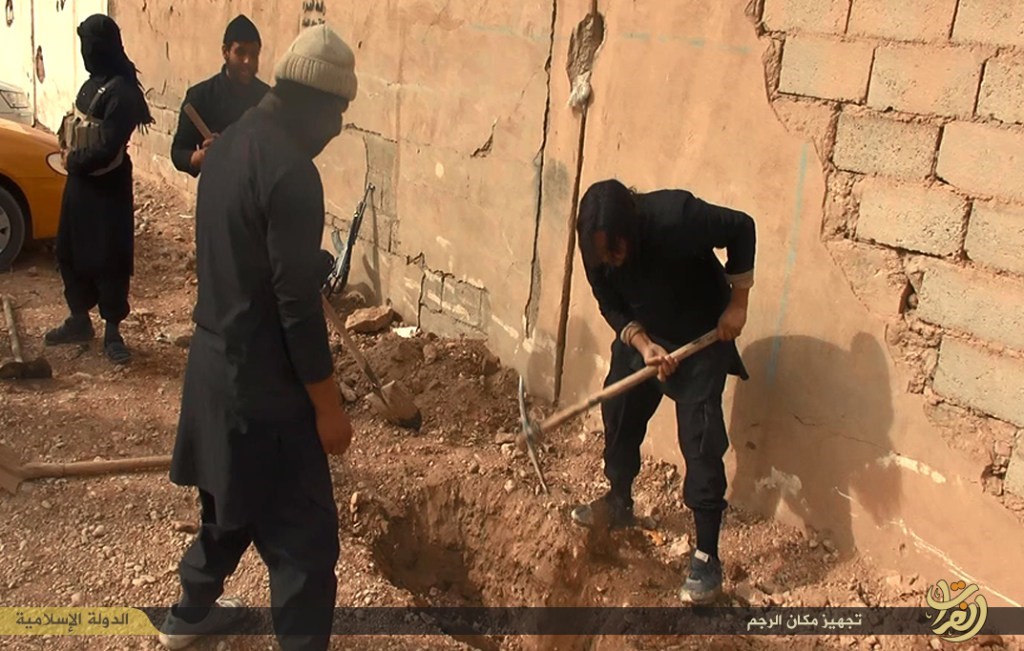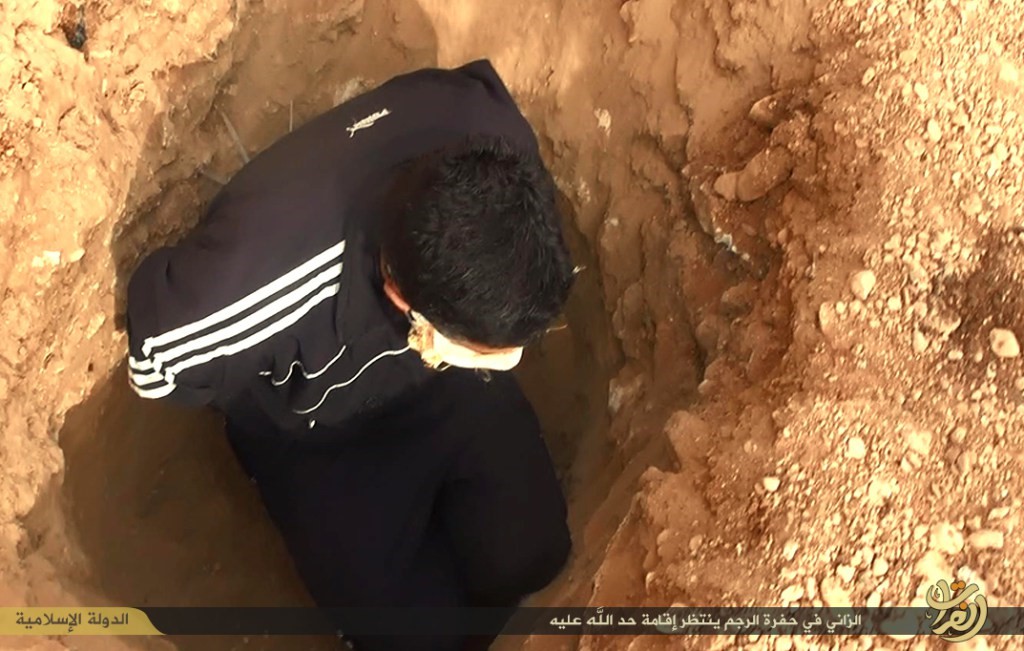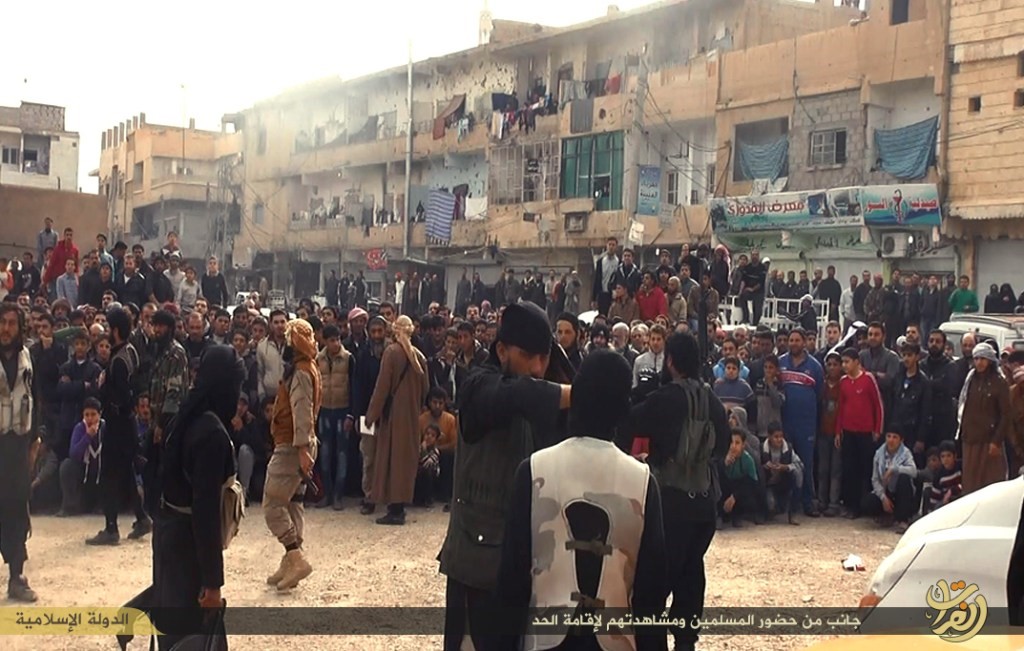Introduction Taking over vast areas of province[1], the so-called Islamic State[2] aka ISIL started imposing harsh laws and issuing arbitrary sentences against civilians including summary executions, whipping, and stoning to death which are hudud
STJ had earlier published a report, contained lengthy and detailed testimony[3] of a civilian received the hadd penalty for theft for the first time in 2017, in Al Bukamal city, Deir ez-Zor, as he was punished with amputation of his right hand.
-
When and how did ISIL take over Deir ez-Zor province
In early July 2014, IS militants invaded Deir ez-Zor province, 36,000 sq.km, after managing to inflict the Syrian regular forces heavy casualties and to expel Al Nusra Front, which controlled massive areas of al-Hasakah province countryside in 2013.
On July 20, 2014, IS managed to take over 95% of Deir ez-Zor province by driving out Al Nusra Front fighters, while the Syrian regular forces stations remained in the province in the part near Palmyra desert. Doing so IS gained another stronghold after al-Raqqa city.
-
A 100 lashes sentence for him and stoning to death for her under charges of adultery
Moussa al-Abdullah, 25, from Al Mayadin city[4], 45km southeastern the center of Deir Ezzor province. He used to work at a food store where he first met his beloved Sahar, 23, as he told STJ[5] in June 2018:
“For about five months, me and Sahar would meet in one of Al Mayadin city cafés, pretending to be her brother, as under IS’s control, women were forced to be accompanied by a male guardian, known as a mahram. We got engaged in early 2017 and agreed to get married after two months during which we would make the marriage preparations.”
In October 2016, something unexpected happened and turned Moussa’s life upside-down:
“At that time, Sahar once told me that a man from IS Hisbah[6] proposed to her but her father told him that she had already engaged. However, the IS man insisted on his proposal, arguing that he is the most deserving of the girl since he “protects the honor of the wilayah”. Actually, I never paid any attention to it until I was taken by Hisbah militias from my work place on October 12, 2016, with the most heinous way. I didn't even know what was happening. My employer tried to ask them what it was all about, but they told him to shut up or he would be arrested otherwise. They pushed me to the ground and dragged me out into a vehicle where they blindfolded me and drove me to Al Hisbah center, eastern Al Mayadin city.” Moussa added.
Moussa was held at Al Hisbah center prison, which is no more than 1x1m2 basement, for a full day without being questioned or fed, but he merely got a drink in a dirty can by the prisoner:
“After spending an entire day in the basement, I was taken to a bigger room, where two masked IS militias came and told me that I was arrested for committing adultery with Sahar, my fiancé. I tried to tell them that the news was false and slanderous and me with Sahar would have an Islamic marriage according to the Quran and Sunnah in a very short time. However, one of them shut me up and said, “It seems like you won't obey if I keep treating you nicely”, I did not understand what he meant. About ten minutes later, they blindfolded me, and I was taken to another ward through a corridor, that took us about two minutes to pass, during which I heard wailings and cries for help.
They closed the door, took off my blindfold and started kicking and beating me with truncheons saying “you must confess to committing adultery with Sahar” until I blacked out, they threw cold water on me and repeated their command again and again, but I insisted to deny the charge, which led them to beat me more violently with tough electric cables until I couldn't take it anymore, and confessed to that false crime and forced to thumbprint on a paper without knowing its contents, then they took me back to the first basement.”
Moussa was brought before the judge of Al Hisbah center three days after his detention, on adultery charges, he tried to defend himself, but the judge paid no heed and sentenced him to 15 days imprisonment and to100 lashes in public along with being exiled from Al Mayadin city after the execution. Moussa goes on to say:
“At the end of my prison term, specifically on November 2, 2016 IS militias came and said that I had to wash and do ablution because my whipping sentence would be carried out the day after in al-Basat square, which is a main square in Al Mayadin, after which I could spend only one day with my family. Indeed, the next day I was driven to al-Basat square in a pickup car, and there I was asked to take off my shirt while IS militias were telling people that I was charged of committing adultery with some girl, and it’s the command of Allah to whip the fornicator to repent. Then an IS fighter started whipping me while the crowded people counting lashes. I fainted after the 5o lash, but they woke me up to resume whipping. When they finished, they left me in the square where my parents and two brothers came to take me home and after only one day I was expelled out of Al Mayadin.”
As he arrived home, Moussa’s family hastened to repair his deep wounds. It was a shock to hear that an IS agent had framed him in order to marry Sahar, as her mother told from Sahar’s family, but the greater shock was to learn that Sahar was stoned to death in al-Basat square also, the same scene where he was whipped.
“It was the darkest moment in my life, I burst into tears. I felt like I hate my city and decided to leave it even if IS cancelled the judgment. Early the following morning, IS militias came to my house, and asked me to say goodbye to my family as I would never reunify with them before the passage of a one year. I was taken to Al Bukamal city, southeastern Deir ez-Zor, and put in Al Salah prison to spend my detention period. I was assigned to collect garbage from the prison bins and dispose them to a landfill out of the city with escorts from IS.” he added.
When battles against IS started in Deir ez-Zor and resulted in the liberate of most of the areas on the eastern bank of the Khabur River, Moussa started planning to escape. Indeed, he managed to leave the prison in late March 2017, with the help of an IS member in exchange for SYP150.000. However, in July 2017, Moussa displaced to one of al-Hasakah camps and still there until now, hoping to hear from his family whom he never heard from for more than a year and a half.
-
Death sentences against civilians
Other similar incidents were documented, as Moussa Al Abdullah told STJ that a 20-year-old young man in Al Mayadin city was stoned to death by IS in November 2014 for allegations of videos in his mobile phone which proven him guilty of adultery. The sentence was carried out in in Al Bakra square with the presence of dozens of civilians including children, along with IS militias.
Another man, who was also charged with the crime of adultery, executed in Al Bukamal city center, at Al Fayha square, in July 2015, on the basis of a report prepared by IS Al Hisbah informers in which they claimed that they saw him committing adultery, so he was arrested and questioned by Al Hisbah which passed a judgement (hadd) on him in the mentioned date, according to local activists.
Moreover, pro-IS al-Furāt Media Foundation published a photo album of stoning a man, on charges of adultery, in Al Bukamal city with people crowd round in the Old Church Square.



IS militias stoning a young man in Al Bukamal city for committing adultery. Taken in: September 2014.
Photo credit: al-Furāt Media Foundation.
[1] On September 9, 2017, “al-Jazeera Storm” military operation launched by the SDF against ISIL in the Deir ez-Zor province with the goal of capturing swathes of territory east of the Euphrates river in the eastern countryside of the Deir ez-Zor. This campaign paralleled with a further one by the Syrian army in the western countryside of the province and they both led to the withdrawn of IS fighters from vast areas of Deir ez-Zor
including cities of Al Mayadin and Al Bukamal, which countryside, bordering Iraq, is still under fire as of the date of this august 28, 2018, until IS militants be cleared.
[2] “Islamic State” group, aka ISIL, founded following the outbreak of the conflict in Syria in 2011 – under the name of “Islamic State in Iraq and the Levant” in April 2013. It was announced to be a result of a merge of “Islamic Iraq State” and “Al Nusra Front” group, which was refused by the latter, asking Al Qaeda leader at the time Ayman al-Zawahiri to leave Syria for it and focus the new group’s operations on Iraq. ISIL was previously active in Iraq under the name of “Jama'at al-Tawhid wal-Jihad” before it turns into “Tanzim Qaidat al-Jihad fi Bilad al-Rafidayn by the assumption of “Abu Musab al-Zarqawi in 2004 and saying pledge of allegiance to the ex-leader of Al Qaeda Osama bin Laden. After the kill of Abu Musab al-Zarqawi by the US forces in 2006, Abu Hamza al-Muhajir was picked a new leader. Few months later, the formation of Islamic Iraq State was announced by its leader Abu Omar al-Baghdadi, who named Abu Hamza al-Muhajir to be his deputy. Abu Bakr al-Baghdadi or “Abdullah Ibrahim”, the successor of Abu Omar al-Baghdadi, announced on June 29, 2014 the Islamic Caliphate and appointed himself as Muslims Caliph, and proclaimed the Syrian’s Raqqa the de facto capital of the "caliphate".
[3] “Fear Allah and Repent to Him, Now Your Hands Will be Amputated”, STJ, June 5, 2018; https://www.stj-sy.org/en/view/560 , (Last edit: August 28, 2018).
[4] ISIL militants were cleared from Al Mayadin city in October 2017.
[5] The interview was conducted by STJ’s field researcher in one of Al Hasakah camps, where the witness has displaced in July 2017.
[6] The IS’s security apparatus to intervene and coercively "enjoining good and forbidding wrong" in order to keep everything in order according to sharia (Islamic law).

